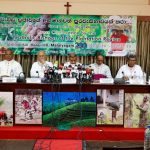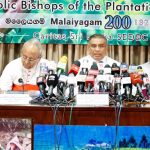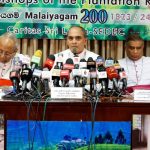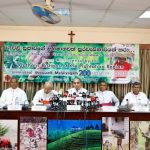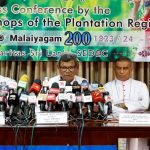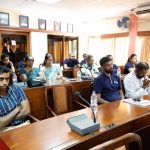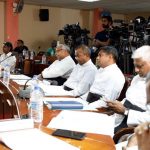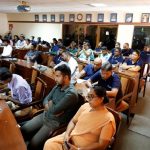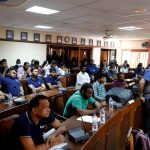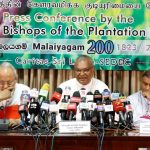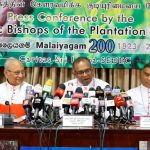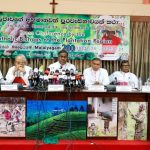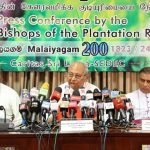In a significant press conference held at Caritas Sri Lanka, SEDEC, on June 30th, 2023, the Catholic Bishops of the Plantation Regions united their voices to address the longstanding unresolved socioeconomic issues faced by the Indian Origin Plantation Community in Sri Lanka. The press conference marked the 200th commemoration of the arrival of the Indian Origin Tamil People of the Plantation Community in the country in and around 1923-24.
The Catholic Bishops of the Plantation Region including Most. Rev. Dr. Harold Anthony Perera, President of the Catholic Bishops’ Conference in Sri Lanka, Most. Rev. Justin Gnanapragasam, Chairman of Caritas Sri Lanka – SEDEC, His Eminence Malcolm Cardinal Ranjith, Archbishops of Colombo, Most. Rev. Valence Mendis, Bishop of Kandy and Chilaw, Most. Rev. Cletus Chandrasiri, Bishop of Ratnapura, Most Rev. Raymond Wickramasinghe, Bishop of Galle, and Most Rev. Jude Nishantha Silva, Bishop of Badulla were present at the event.
The primary objectives of the press conference were two-fold. Firstly, it aimed at identifying the persisting socio-economic issues that have remained unresolved due to the unstable policies and inadequate implementation by successive governments and plantation management. Secondly, the Catholic Bishops of the Plantation Region presented a series of recommendations to include the vulnerable Plantation Community in the national social services, ultimately striving for their meaningful citizenship in Sri Lanka.
Most. Rev. Harold Anthony, President of the Catholic Bishop’s Conference in Sri Lanka, explained the purpose of the press conference to educate and raise awareness among the rulers, general public, and stakeholders about the enduring agony of the Plantation Community over the past two centuries. He emphasized the need to address critical areas such as education, health, land and housing, livelihood, and culture and heritage, urging the government to take appropriate action to uplift the community and grant them their deserved dignity as citizens of the country.
Most. Rev. Valence Mendis, Bishop of Kandy and Chilaw, highlighted the wage issues faced by the Plantation Community. Despite a promised increase of Rs. 1000 two years ago, the raise has not been implemented. The community’s limited working days, ranging from two to three days per week, result in meager monthly earnings of only Rs. 15,000. Moreover, the tea pluckers struggle to meet their daily target of 18kg of tealeaves due to the scarcity of leaves.
Bishop Mendis also expressed concerns about the lack of interest and involvement from the Sri Lankan state in providing adequate public administration to the plantation region. Insufficient representation of Grama Niladharis in these estates has resulted in a lack of infrastructure facilities such as roads, houses, and toilets. Many community members continue to reside in line rooms, despite the Indian Government having built 40,000 houses for the Plantation Community. The bishops emphasized their continuous advocacy for the welfare of this marginalized group.
His Eminence Malcolm Cardinal Ranjith, Aarchbishop of Colombo , addressing the historical exploitation endured by the Plantation Community called for the appointment of an independent commission to investigate the unsolved problems faced by this community over the past two centuries. He criticized the plantation companies for perpetuating exploitation, emphasizing that providing mere housing and infrastructure facilities would not solve the deep-rooted issues faced by the community. Cardinal Ranjith stressed the importance of treating them as human beings and demanded that the government recognize their contributions to the economy and grant them their rightful status as dignified citizens.
Forwarded several recommendations to their unresolved socio- economic issues for the last 200 years, Cardinal Ranjith emphasized the need for a holistic and inclusive approach to addressing the socio-economic issues faced by the plantation community in Sri Lanka. He called for the government and other stakeholders to take proactive measures to address their needs and ensure their full integration into society.
Most. Rev. Cletus Chandrasiri, Bishop of Ratnapura, highlighted the lack of opportunity for the Plantation Community to live as dignified citizens alongside other communities. He emphasized the need to protect their unique identity, traditions, and literature, which are slowly fading away. Recognizing their services rendered to the country over the past two centuries, he urged for their rightful recognition and support.
Bishop Raymond Wickramasinghe, Bishop of Galle, drew attention to the non-availability of adequate Tamil Stream Schools in the Plantation regions, violating the right of Tamil children to study in their mother tongue. He recommended the establishment of Tamil stream schools in specific regions or the introduction of Tamil Stream in Sinhala medium schools, promoting social integration among diverse ethnic and religious communities. Bishop Wickramasinghe also highlighted the need for preschools, known as ‘Child Development Centers,’ to be managed nationally rather than under the Plantation Human Development Trust (PHDT) of the Regional Plantation Companies (RPC).
Furthermore, Bishop Wickramasinghe stressed the lack of vocational training centers in the Plantation Region offering courses in Tamil medium. He called for the introduction of such courses under the Vocational Training Authority (VTA) to address the needs of the Plantation community. He further emphasized the urgent need for a state university campus affiliated with an existing university in the plantation region, specifically focused on preserving the plantation industry, environment, traditional art, culture, and literature of the Plantation Community.
Most Rev. Jude Nishantha Silva, Bishop of Badulla, pointed out that the Plantation Community does not enjoy the benefits of poverty eradication programs such as ‘Samurdhi.’ Despite earning a monthly income of Rs. 15,000, they are excluded from the program due to its income eligibility criteria. Bishop Silva also highlighted the high poverty rates and malnutrition among children in the Central and Uva provinces, where 78% of the Plantation Community resides. He emphasized the importance of reducing existing land use restrictions and promoting alternative livelihoods, such as animal husbandry, agriculture, home gardening, flower gardening, and small businesses, to uplift the community from poverty.
The Catholic Bishops of the Plantation Region have called for immediate action to address the unresolved socioeconomic issues faced by the Indian Origin Plantation Community in Sri Lanka. Their recommendations encompass critical areas such as wages, infrastructure, housing, education, language rights, vocational training, and poverty eradication. The Bishops urged the government and relevant stakeholders to prioritize the integration and well-being of this vulnerable community, thereby fostering meaningful citizenship and social inclusion in Sri Lanka.
Following the above, there was questions from the media personnel. This Press Conference was arranged under the Lighting the Lives of Plantation People project funded by Catholic Relief Service (CRS) and fully organized by the Environmental Conservation and Plantation People Unit of Caritas Sri Lanka – SEDEC.


